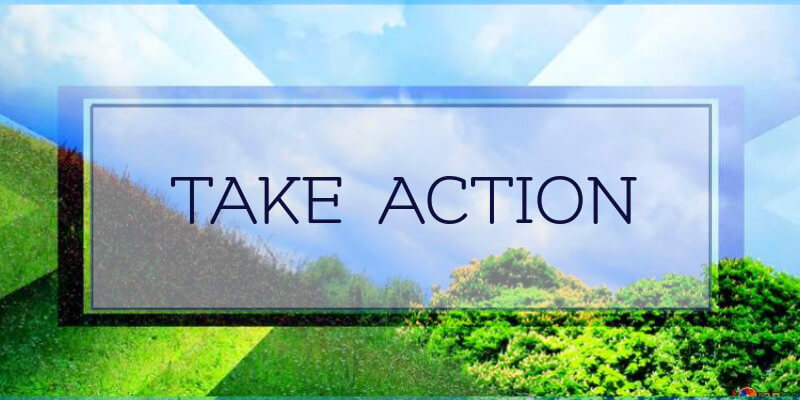
WHAT CAN WE DO TO HELP SAVE THE ENVIRONMENT?
WHAT ACTIONS CAN BE TAKEN?
A Video Message from Young Catholics in Australia, Africa and the United States about how climate change is already impacting their communities.
Taking Action at Home
Brainstorm what lifestyle changes you can make as an individual or family to reduce your own consumption in order to better protect God’s creation. Here are some ideas based on those Pope Francis mentions in Laudato Si’ (no. 211):
1. Use fewer paper and plastic products – e.g. use a re-usable water bottle
2. Reduce water consumption – e.g. take shorter showers, wash dishes by hand, etc.
3. Don’t cook more than you will consume
4. Compost (instead of disposing) food waste
5. Recycle
6. Reuse instead of disposing
7. Use public transportation, carpool, walk, or ride a bike
8. Conserve electricity – e.g. turn off lights and buy energy-efficient appliances
9. Plant trees
Taking Action in my Parish,
at School, or at Work
Brainstorm what institutional changes you can make in your parish, faith community, school or workspace. Here are a few ideas:
1. At Catholic institutions, ensure that learning about care for God’s creation is part of formation for both adults and youth. Educational resources, homily helps, and more are at www.usccb.org/environment. A study guide for Querida Amazonia, Pope Francis’ 2020 post-synodal Apostolic Exhortation is also available.
2. During Laudato Si’ week (May 16-24, 2020), which was established by Pope Francis, plan activities to engage your parish to pray, learn and act in response to Laudato Si’.
3. Do an energy audit to identify where energy consumption could be reduced. Such an audit will benefit both the earth and your institution’s budget!
4. Consider going solar. Explore whether efforts are happening in your local community to form solar cooperatives, in which institutions purchase affordable solar energy in bulk.
5. Implement recycling and composting.
6. At events where food or beverages are consumed, and in cafeterias, replace disposable
cups, plates, and silverware with washable or compostable items.
7. Donate leftovers to local soup kitchens, or cook only what will be reasonably consumed.
8. Offer employees benefits for using public transportation or carpooling.
9. Conserve electricity – e.g. turn off lights and air conditioning during non-business hours
and buy energy-efficient appliances.
10. Plant trees on your institution’s property.
11. Take the St. Francis Pledge (below).
12. Find out about and join efforts to care for creation in your local community.
13. Find out what other faith communities across the United States are doing to care for
God’s creation: http://www.wearesaltandlight.org/success-stories-act
Taking Action in my State
1. Encourage lawmakers to improve and update public transportation options. When effective and far-reaching public transportation systems are in place, fewer cars clog the roads to emit greenhouse gases and air-polluting contaminants.
2. Join local efforts of groups working with elected officials and community leaders to explore ways your local community can do business in sustainable ways, reduce harmful emissions, and use renewal energy.
3. Organize or participate in local and state Earth Day celebrations to raise awareness of the challenges of climate change and move towards sustainability.
4. Pay attention to legislation going before the state legislature that concern climate, emissions, or energy policies. Urge legislators to remember that people who live in poverty in your state may suffer the most from climate change and that legislative measures should include provisions that address disproportionate economic impacts, e.g., in heating and transportation costs.
5. Consider how we can allow the Holy Spirit to move us toward innovative, creative solutions that create jobs and care for people and God’s creation.
Taking Action Nationally
The United States Conference of Catholic Bishops is urging that any legislative action on climate change include provisions that (a) ease the burden on low-income communities and those who live in poverty; (b) offer relief for workers who may be displaced because of climate change policies; and (c) promote the development and use of alternate renewable and clean-energy resources, including the transfer of such technologies and technical assistance that may be appropriate and helpful to developing countries in meeting the challenges of climate change. Write to your senators and representatives in Congress to let them know that you care about climate change and support action on a national level that includes the three key priorities above. For background information on the issue, go to www.usccb.org/environment and the Catholic Climate Covenant catholicclimatecovenant.org.
Across the United States, Catholics are taking the St. Francis Pledge to Care for Creation and the Poor and joining the Catholic Climate Covenant. The St. Francis Pledge is a promise and a commitment by Catholic individuals, families, parishes, organizations and institutions to live our faith by protecting God’s Creation and advocating on behalf of people in poverty who face the harshest impacts of global climate change. To join the Covenant, you commit to act on each of the five elements of the St. Francis Pledge.
TAKE THE SAINT FRANCIS PLEDGE
Take the St. Francis/Laudato Si’ Pledge to mark the fifth anniversary of Pope Francis’ encyclical, Laudato Si’: On Care for Our Common Home. By taking the pledge, you (re)commit to living out the vision of the encyclical and our Catholic faith through prayer, concrete action, and advocacy. Get started on your journey to care for creation and the poor. We invite you to (re)commit or for the first time commit by taking the pledge today!

Other Resources
=====================
50 Ways to Help Save the Planet: https://www.50waystohelp.com/
Info On Composting: https://www.epa.gov/recycle/composting-home
https://grillio.com/blog/grillios-guide-to-food-waste-and-composting/
Info On Water Conservation: https://www.nationalgeographic.com/environment/freshwater/water-conservation-tips/
Info on Plastics: https://www.forbes.com/sites/grrlscientist/2018/04/23/five-ways-that-plastics-harm-the-environment-and-one-way-they-may-help/#5e7299e467a0
Info on Social Justice and the Environment: http://css.umich.edu/factsheets/environmental-justice-factsheet
